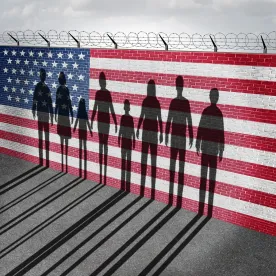On March 6, 2017, President Trump signed a revised Executive Order, entitled: Protecting the Nation from Foreign Terrorist Entry into The United States (“new order”). The new order suspends admission to the United States foreign nationals from six countries for a 90 day period, including: Iran, Libya, Somalia, Sudan, Syria, and Yemen. Under the new order, Iraq is no longer included in the list of barred countries as it was in President Trump’s first executive order. The new order will go into effect on March 16, 2017, at 12:01 a.m. and it rescinds President Trump’s January 27, 2017 Executive Order (“old order”) once the new order becomes effective. The new order was released in an attempt to withstand court challenges and delays implementation to avoid the chaos of the old order.
Despite the changes, a number of groups have already expressed their intention to challenge the new order, so it is important to understand that enforcement of the new order’s provisions is fluid. Readers should check with attorneys of Dickinson Wright’s Immigration Group for up-to-the-minute information on the new travel ban.
Foreign Nationals Affected
Only foreign nationals from the six designated countries who are outside the United States, and either do not have a currently valid visa on the effective date of the new order, or did not hold a valid visa on January 27, 2017 will be unable to travel or request admission to the United States.
As in the case of the old order, the new order also suspends refugee admissions to the U.S. as well as requests for adjudication of refugee status from all nationals of all countries for a period of 120 days from the effective date of the new order. Refugee applicants who were previously approved for transit to the U.S. prior to the new order’s effective date will be permitted to travel as well as to request admission to the United States. Like the old order, the new order limits the total number of refugees able to be admitted to the United States for fiscal year (FY) 2017 to 50,000.
Exempt Foreign Nationals
Under the new order, certain foreign nationals continue to remain eligible to request admission to the U.S., including foreign nationals from one of the six designated countries who hold a currently valid visa. They include:
-
Any lawful permanent resident (or green card holder) of the U.S.;
-
Any foreign national who is admitted or paroled into the United States on or after the effective date of the new order;
-
Any foreign national who holds a document other than a visa valid on the effective date of the new order or is issued on any date thereafter that permits him or her to travel to the U.S. and who seeks entry or admission such as an advance parole document;
-
Any dual national of a country designated under the new order when the individual is traveling on a passport issued by a non-designated country;
-
Any foreign national traveling on a diplomatic-type visa, North Atlantic Treaty Organization visa, C-2 for travel to the United Nations or G-1,G-2, G-3, or G-4 visa; or
-
Any foreign national who has been granted asylum, any refugee who has already been admitted to the U.S.; or any individual who has been granted withholding of removal, advance parole, or protection under the Convention Against Torture.
Waiver Available?
Notwithstanding the suspension of entry to the U.S. of designated nationals under the new order, a Consular Officer, a U.S. Customs and Border Protection Officer or a Commissioner’s delegate may decide, on a discretionary, case-by-case basis to authorize the issuance of a visa, or to permit entry to the U.S. of any foreign national of a designated country if the foreign national has demonstrated to the officer’s satisfaction that denying entry during the suspension period would cause undue hardship, and that his or her entry would not pose a threat to national security and would be in the national interest. The waiver would be effective both for the issuance of a visa and any subsequent entry on that visa, but will leave all other requirements for admission to the U.S. unchanged. Appropriate circumstances could include:
-
The foreign national was previously admitted to the U.S. for a continuous period of work, study, etc.;
-
The foreign national has previously established significant contacts within the U.S. but is outside the U.S. on the effective date of the new order for work, study or other lawful activity;
-
The foreign national seeks to enter the U.S. for significant business or professional obligations and the denial of entry during the suspension period would impair those obligations;
-
The foreign national seeks to enter the U.S. to visit or reside with a close family member such as a spouse, child or parent who is a U.S. citizen, lawful permanent resident, or alien lawfully admitted on a valid nonimmigrant visa, and the denial of entry during the suspension period would cause undue hardship;
-
The foreign national is an infant, a young child or adoptee, an individual needing urgent medical care, or someone whose entry is otherwise justified by special circumstances;
-
The foreign national has been employed by, or on behalf of, the U.S. government (or is an eligible dependent of such an employee) and the employee can document that he or she has provided faithful and valuable service to the U.S. government;
-
The foreign national is traveling for purposes related to an international organization designated under the International Organizations Immunities Act (“IOA”), traveling for purposes of conducting meetings or business with the U.S. government, or traveling to conduct business meetings on behalf of an international organization not designated under the IOA;
-
The foreign national is a landed immigrant in Canada who applies for a visa at a location within Canada; or,
-
The foreign national is traveling as a U.S. government-sponsored exchange visitor.
Visa Interview Waiver Program
In addition to the temporary admission ban, the new order suspends the Visa Interview Waiver Program, and requires an in-person interview of all nonimmigrant visa applicants. The suspension of the interview waiver program does not apply to foreign nationals traveling on a diplomatic-type visa, North Atlantic Treaty Organization visa, C-2 for travel to the United Nations or G-1, G-2, G-3, or G-4 visa.




 />i
/>i
